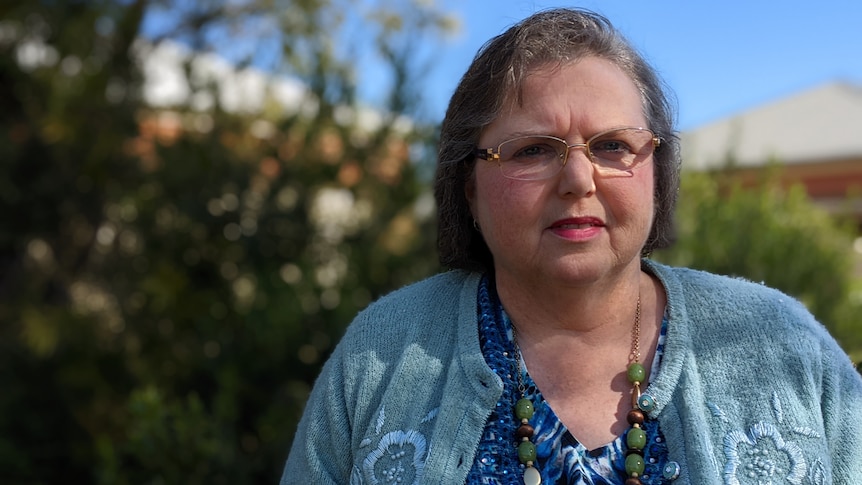Pauline Follett has been struggling to get on the National Disability Insurance Scheme (NDIS) for three years and is “frustrated” with the health system.
The 54-year-old has been living with cerebral lupus for nearly 30 years and depends on her disability pension as her main source of income.
Lupus can damage nerves in the body through inflammation of nerves or the tissues surrounding them.
The condition affects Ms Follett’s balance, which makes it difficult for her to walk and do tasks such as cooking, cleaning and driving.
She lives by herself in Gol Gol, in far west New South Wales, and has limited support.
“It becomes very difficult when you become too unwell to stay in one’s home. You have to have support when you’re disabled,” Ms Follett said.
The first time she applied for NDIS, she said the assessors focused “on the wrong thing”, that she lives with osteoporosis rather than lupus.
The second time Ms Follett applied, she said she was told her specialists could do more for her.
The support she receives is from a local disability service provider, but only includes assistance with transportation and cleaning.
And that support is not guaranteed, as Ms Follett is reassessed for it every six weeks.
That has meant she has made nearly 30 applications over the past three years to maintain the help.
“It’s all up in the air, all the time … You’re not guaranteed, it’s very tiring,” she said.
“You have to be on the ball all the time, which is difficult when you’re ill.”
Uncertainty exacerbates condition
She likes living in her own home but without the right help, she believes she could be forced to leave and fears being unable to find stable aged care accommodation, which would put her at risk of homelessness.
“Item [aged care] is difficult to get here. It’s not as readily available to us, so to have something like that. It’d be very hard to access,” she said.
Ms Follett said the uncertainty of NDIS providing support had affected her mental health, which had taken a toll on her physically.
“I’m very stressed, and with my lupus, stress is something that exacerbates my condition, so it makes it worse,” she said.
Ms Follett is not alone in finding access to services difficult.
Calls on government to do more
Disability Advocacy NSW released The Aussie Battlers report to the ABC, detailing issues people living with disabilities face in rural, regional and remote (RRR) NSW.
It showed 61 per cent of cases in RRR areas had difficulties meeting evidence requirements due to limited accessibility of service providers.
In RRR NSW, 73 per cent of people reported their service accessibility as poor or very poor.
Disability Advocacy NSW policy officer Cherry Baylosis said the results were not surprising.
“It is concerning when I confirmed these experiences persist despite some of the efforts that were made,” Dr Baylosis said.
She is calling on the government to involve people with disabilities in policymaking.
“At the very least to have consultations with people with disabilities who live in remote areas for better engagement and participation, and then developing considerations within policy based off that,” she said.
“I would like policy to take into consideration the complexities of people with disability living in regional, rural and remote areas to consider the complications — such as the cost of living with a disability.”
Delays from service providers
There are 750 NDIS recipients in far west New South Wales as of June 30, but far west NSW Disability Advocacy district manager Eveleen May said there would be a “lot more” people who were in need of assistance.
She said a lack of healthcare workers and their retention in the region was a contributing factor.
“Doctors find themselves in a position of not having enough time to actually write up a very strong report to help a person access the scheme,” she said.
The research found that due to limited services for participants in RRR, it takes 2.4 times longer to resolve a matter compared to those in metropolitan areas.
Sometimes the delay is due to difficulties in obtaining evidence.
“We have doctors come and go and not often stick around for a long period of time, and we hear from our clients the waiting lists can be quite lengthy,” she said.
Ms May said the further west you traveled into NSW, the greater the financial and service issues were.
“Broken Hill has very much of an aging population, and a high number of Aboriginal people who have a disability too,” she said.
All Pauline Follett wants is to stay in her home with ease as she applies for NDIS the third time.
“I have a permanent disability, and I’m not going to get any better. If I don’t get this service, well, then I’m on my own, and that stresses me out a lot,” she said.
NDIA acknowledges ‘need to improve’
A National Disability Insurance Agency (NDIA) spokesperson said they empathised with Ms Follett’s situation. They said services had “a strong focus on connecting Australians with a disability to local supports”.
“The agency acknowledges the need to continue to improve the NDIS so that it works for everyone,” they said.
“This includes addressing the historical challenges faced by people with disability in finding support services in rural and remote areas, including parts of far western New South Wales.
“The NDIA will work proactively with the government to work through issues for people in rural and regional areas accessing the scheme.”
.


